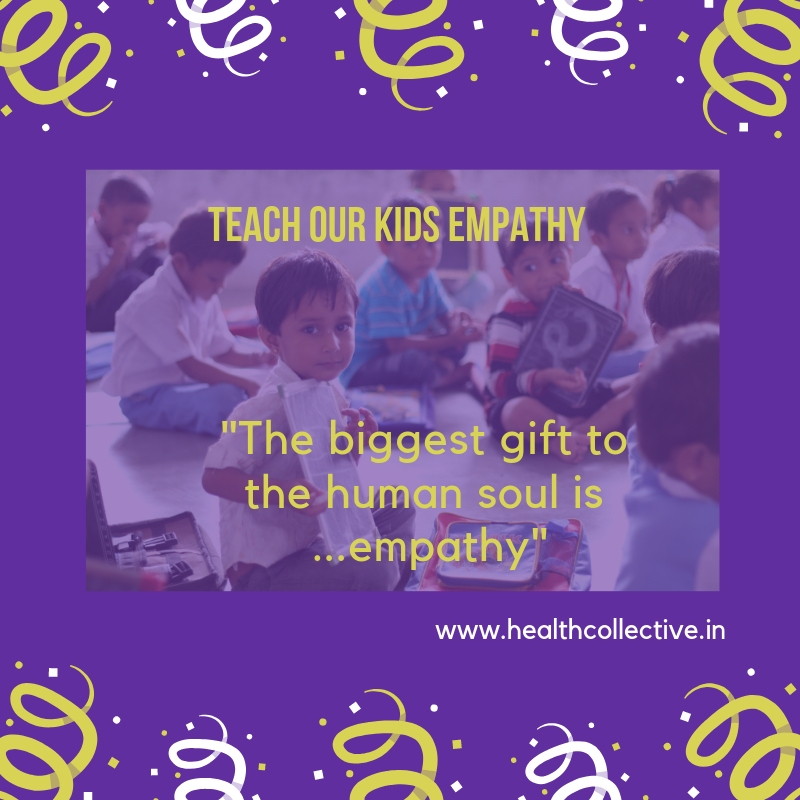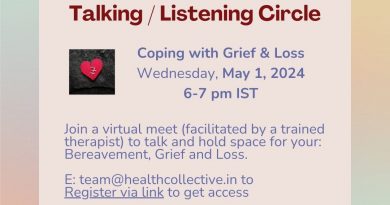How to Ensure Empathy as a Self-Care Tool for Your Child
By Mimansa Singh Tanwar
Moving to a different country just (a few) months ago, it hasn’t been easy for my 5-year-old to adjust to school. New people, a new language and new surroundings made it seem like a new planet to her. Struggling with connecting and understanding her peers, she would feel quite angry and helpless. A month into settling in, she once shared something, quite concerned about her friend. The conversation between us went like this:
Daughter: “Mummy, Annie was crying, her grandma is leaving forever.”
Me: “Your friend’s grandmother is leaving! How was she feeling?”
Daughter: “I asked her, ‘Are you fine?’ And she said no!”
Me: “And how did you feel hearing that?”
Daughter: “Not good!”
Me: “So, what did you do then?”
Daughter: “I just sat next to her…”
Me: “Oh, that was a great way to help her!”
On another instance, we went to the playground one evening. While I was talking to a friend, my daughter was playing with her two friends. One of them suddenly stopped playing and ran to the corner crying,“I want to go to my mom!” Unfortunately, his mother was out, on a work trip. Seeing that from a distance, I took a few steps towards him. But before I could reach, I saw my daughter running towards him, hearing him cry. I paused to watch them both. She just sat next to him in silence; bowing down to peep into his eyes once, she continued to sit quietly. After 2 minutes, she asked him in a soft voice, “Do you want to play?” The boy wiped his tears and joined her in play. I saw how a non-verbal, empathetic communication between two friends helped one overcome a difficult emotion and helped them regain their playfulness.
ALSO READ: ASK THE EXPERTS: BULLYING AND SCHOOL KIDS

The biggest gift to the human soul is to feel empathy — compassion, care and love towards one’s self and others. It is the ability to feel what the person is going through; you may have gone through similar experiences or you might just be putting yourself in their shoes intrinsically to connect with how they might be feeling. This connection has the power to help us heal and deal with difficult times.
Working on empathetic skills has largely been under-explored during the developmental years of our children. Undoubtedly, social and emotional learning is gaining attention in the education sector —as well it should. However, the real application of these skills at multiple levels is largely missing. I believe, as parents we can play a crucial role in harnessing emotional skills in our children through empathetic conversations and dialogue that acknowledges emotions as tangible. Caring for a child’s emotions translates into a feeling of comfort, security, love and compassion that the child is able to in turn reflect to the outside world.
ALSO READ: THE IMPORTANCE OF SELF-CARE
Inculcating Self-Care by Building Empathy
We teach our kids about taking care of physical health, sleep, diet and routine as a part of self-care. Given the growing challenges of everyday life that children face today, we need to foster emotional care as well. Emotions play a role in navigating decisions, behaviours and thoughts. Healthy emotional development lays the foundation for critical thinking and an assured sense of self. To accomplish this through our interactions, the approach to parental conversations needs to undergo change, with a more open-ended and emotion-focused dialogue in place.
- Empathetic reflection while listening: Children need to be heard more, with close attention paid to their stories. Make your interactions with them more engaging by using simple prompts and questions like:“Really, how did you feel about it?” (Understanding the Emotion)
“And as I understand, it can be hard!” (Empathetic Reflection)
This brings about a deeper connection as you are making the effort to see and feel what your child observed. It is not necessary to always have a solution to a conversation. Mere empathetic listening provides validation to the child’s experience - Acknowledge your child’s emotions: Acknowledge your child’s emotions by saying it out loud. As parents we may worry that talking about anger or irritability will exaggerate the feeling. However, bringing the emotion on the table creates acceptance for their feelings. For example, instead of saying, “I don’t get it, why do you have to go to your friend’s house so frequently? You just like to be out all the time!” Phrasing it as,“I understand that you are angry with me and you would really like to go to your friend’s house. How about we mutually decide on how best can we resolve this?” makes your child feel understood!
- Emotional awareness: Inquiring about your child’s feelings builds emotional awareness. It enhances the child’s ability to identify emotions in a particular situation and express themselves more articulately. Emotional awareness increases the insight into one’s own experiences and those of others too. For example: “I feel hurt when they laugh at me”, or “It was a joyful day at school”, or “I feel irritated when I am asked to switch off the TV 100 times!”
An emotionally aware child has the potential to control and gear thoughts and behaviours in a given situation. Some children may struggle with naming the emotions and you can act as an aid by stating various emotions for them to choose from - Strategies to manage difficult emotions: It is important to develop self-soothing or calming strategies in your child. Create a list of activities along with your child that they can engage in to help themselves feel better — when they are feeling sad, angry, irritated, ashamed or even guilty – — and further increase moments of joy and happiness. This helps in strengthening emotional regulation system, and fosters self-love and self-care.
Building empathetic skills is a continuous process and like any other, is bound to hit its highs and lows. However, consistency and steadiness will go a long way in setting the stage for healthy self-growth. In an unknown world, feeling isolated and disconnected, empathetic connection and skills augmented social understanding for my child. By showing concern and sensitivity towards her peers, she formed new relationships while still struggling to understand the language. Through emotional care, she regained her sense of joy, happiness and playfulness. Give your child the power to feel compassion towards self and others and cultivate a strong sense of self.
About the Author: Mimansa Singh Tanwar is a Consultant Clinical Psychologist and leads the Fortis School Mental Health and Clinical Psychology Program with the Department of Mental Health and Behavioural Sciences. She has been practising for the last 8 years and has worked with children and adolescents. Her areas of expertise also involve working with personality disorders, substance abuse, eating disorders and marital therapy. You can find her on Twitter @mimansasingh or on Insta @mimansa.singh
Disclaimer: Material on The Health Collective cannot substitute for expert advice from a trained professional.
If you would like to share your story, do write to us here or tweet us @healthcollectif
Feature Image by rawpixel.com



